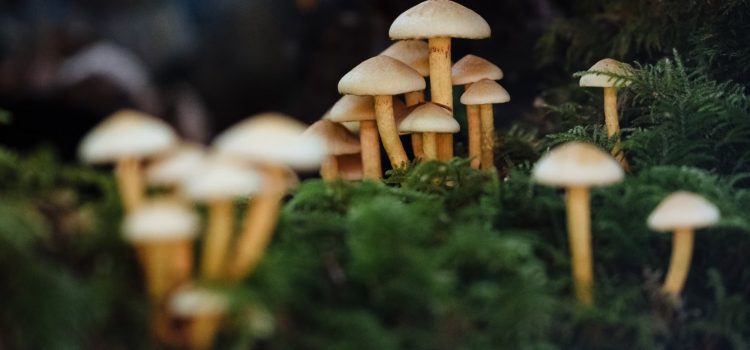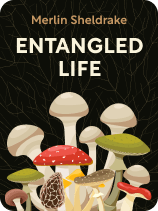

This article is an excerpt from the Shortform book guide to "Entangled Life" by Merlin Sheldrake. Shortform has the world's best summaries and analyses of books you should be reading.
Like this article? Sign up for a free trial here.
Why is Merlin Sheldrake fascinated with fungi? How do fungi expand our imaginations?
According to Merlin Sheldrake, fungi push us to consider new ways of thinking about ourselves, other people, and non-human beings. It’s no wonder that Sheldrake wrote Entangled Life, a whole book about the beauty of fungi.
Here, we’ll explore two concepts that fungi challenge us to question: individuality and intelligence.
Rethinking Individuality
According to Merlin Sheldrake, fungi aren’t typically thought of as individuals. He claims that we tend to think of an organism as an individual contained within the borders of its flesh. The concept of individuality presumes that being physically separate makes organisms independent actors. For instance, because you’re assumed to be an individual, you’re legally responsible for your choices. (Shortform note: This view that organisms are individuals has persisted throughout the field of biology since its emergence in the late eighteenth century. Historians note that for the past several centuries, biologists have largely used the terms “individual” and “organism” interchangeably.)
However, according to Sheldrake, fungi remind us that organisms aren’t physically separate from each other. Recall how photosynthetic symbionts live within lichenized fungi, and mycorrhizal fungi live within the roots of plants. Like fungi, humans depend on symbiotic relationships. For instance, we provide the microbes in our gut with room and board; in turn, they help us with digestion.
(Shortform note: Sheldrake doesn’t explicitly define how he uses the term “gut,” in his book, but we can infer that he’s referring to the entire digestive system—what Giulia Enders describes in Gut as a complex system of muscles, organs, and bacteria.)
Because organisms aren’t physically separate, it’s inaccurate and unhelpful to think of an organism (such as a human) as an independent individual. Thus, according to Sheldrake, we should de-emphasize the concept of individuality in both science and society.
| The Implications of De-emphasizing Individuality Sheldrake suggests that it’s inaccurate and unhelpful to think of organisms as individuals, but he doesn’t explore in depth what it might look like to de-emphasize the concept of individuality in science and society. To illustrate what this perspective may look like in practice, we can look to the field of medicine, where experts are experimenting with designing healthcare systems that de-emphasize individuality. According to one healthcare expert, doctors are typically trained to think of a patient as a separate individual, much like a machine. To heal the patient, you just need to fix what’s wrong with their body, like how a mechanic might repair a broken part in a machine. However, this approach, which emphasizes the individual, doesn’t always work. For example, imagine a patient, Dawn, who frequently ends up at the hospital due to alcohol poisoning. Even if a doctor expertly “fixes” Dawn by clearing her system of alcohol, this treatment won’t necessarily prevent her from suffering from alcohol poisoning in the future. By contrast, some healthcare systems de-emphasize individuals by implementing treatments beyond the borders of their bodies. For example, one healthcare program in the UK places medical experts in non-healthcare settings (such as schools) to support efforts that promote preventative health. Returning to our earlier example, this type of healthcare system might invest money and resources in preventing alcoholism so patients like Dawn are less likely to end up in the hospital in the first place. |
Rethinking Intelligence
Fungi also challenge us to question our ideas about intelligence. According to Sheldrake, we typically define intelligence based on whether a living thing possesses a brain. Creatures like humans and dogs are intelligent, and creatures that lack brains (like fungi) lack intelligence.
However, Sheldrake claims that fungi exhibit a behavior that we typically associate with intelligence: decision-making. For instance, as we explored earlier, fungi use their hyphae to gather sensory input, then they respond by changing how they grow—either toward or away from stimuli. Sheldrake calls this a decision because fungi use the information they’ve gathered from sensory inputs to choose one course of action (such as growing toward a stimulus) over another (such as growing away from it). In calling this type of decision a form of intelligence, he references the Latin roots of the word intelligence, which means “to choose between.”
Given fungi’s ability to make decisions, Sheldrake argues that we should do away with our limiting binary of “intelligent” and “unintelligent” as well as the idea that you must have a brain to possess intelligence. Instead, we should instead think of intelligence as a spectrum. With this view, most organisms would be regarded as having some degree of intelligence based on their decision-making abilities.
According to Sheldrake, redefining intelligence in this way could improve how humans interact with the natural world. He believes that we may respect fungi and other organisms more if we think of them as intelligent decision-makers with agency rather than unintelligent, passive beings. We may be less likely to destroy ecosystems and more likely to increase our study of non-human life so we can better understand other organisms’ needs.

———End of Preview———
Like what you just read? Read the rest of the world's best book summary and analysis of Merlin Sheldrake's "Entangled Life" at Shortform.
Here's what you'll find in our full Entangled Life summary:
- An examination of what we know and don't know about fungi
- How fungi can help solve many modern-day problems
- The three most important benefits of fungi






